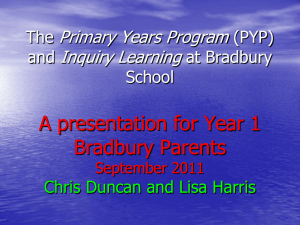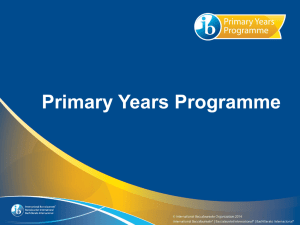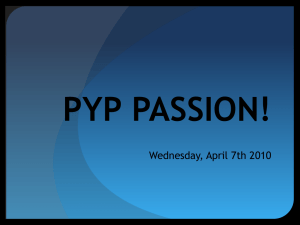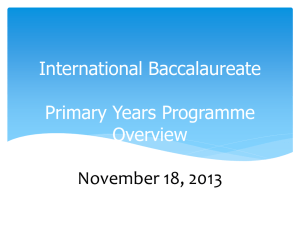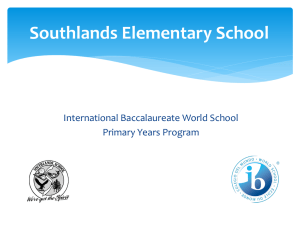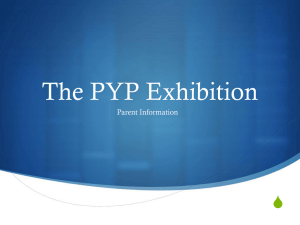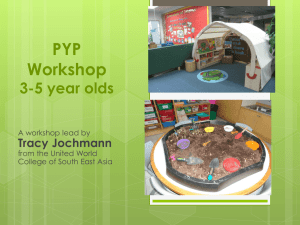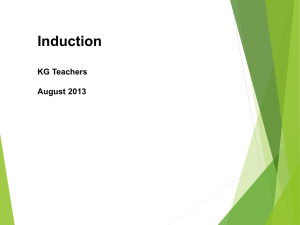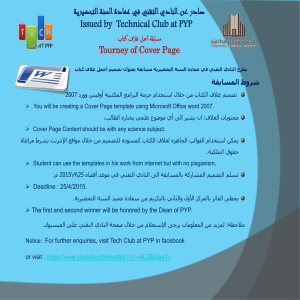Curriculum-Policy-Senior-Junior-Schools
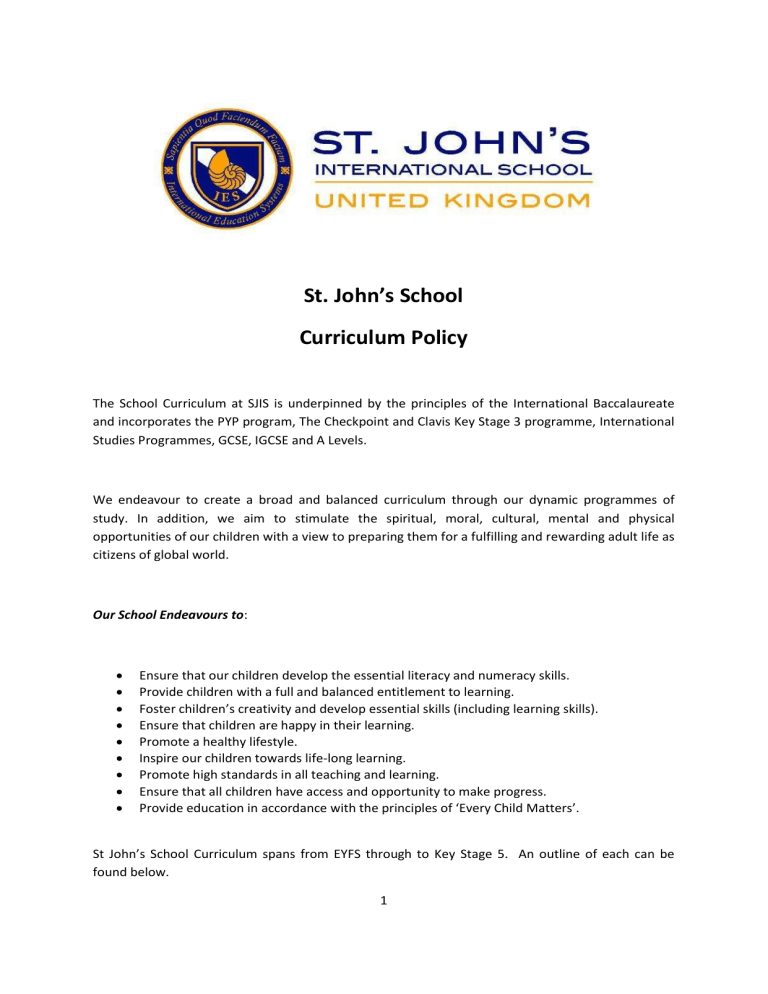
St. John’s School
Curriculum Policy
The School Curriculum at SJIS is underpinned by the principles of the International Baccalaureate and incorporates the PYP program, The Checkpoint and Clavis Key Stage 3 programme, International
Studies Programmes, GCSE, IGCSE and A Levels.
We endeavour to create a broad and balanced curriculum through our dynamic programmes of study. In addition, we aim to stimulate the spiritual, moral, cultural, mental and physical opportunities of our children with a view to preparing them for a fulfilling and rewarding adult life as citizens of global world.
Our School Endeavours to:
Ensure that our children develop the essential literacy and numeracy skills.
Provide children with a full and balanced entitlement to learning.
Foster children’s creativity and develop essential skills (including learning skills).
Ensure that children are happy in their learning.
Promote a healthy lifestyle.
Inspire our children towards life-long learning.
Promote high standards in all teaching and learning.
Ensure that all children have access and opportunity to make progress.
Provide education in accordance with the principles of ‘Every Child Matters’.
St John’s School Curriculum spans from EYFS through to Key Stage 5. An outline of each can be found below.
1
Early Year Foundation Stage
The EYFS Department manage two curricular within their planning and assessing.
We have a statutory obligation to report on the children's progress through the EYFS and so all assessments, observations and progression is carried out with the Development Matter document, which details the development of the children through various age bands.
Children who are younger than preschool age (we admit children from 2 1/2 years old) are working exclusively with EYFS. Our continuous provision is very much planned using the EYFS and differentiated between our younger children and our preschool age children. The age bands provide a flexible assessment of the children's needs and some children will be working at a higher or lower level than their exact chronological age and so our line between PYP and non-PYP is flexible. The
Nursery uses a two year rolling programme of Inquiries.
Preschool and Reception children are part of the PYP curriculum. The adult led activities are planned using our Scope and Sequence documents and our termly inquiries. This does mean that the younger children sometimes take part in these activities. The preschool children take part in end of inquiry assessments.
The Curriculum documents for EYFS can be found on the S drive in the EYFS folder and Manager's file. The PYP planning is included within the Junior School Curriculum documents.
Primary Years Programme (IB)
At St. John's we follow the International Baccalaureate Primary Years Programme (referred to as the
"PYP"). St John's is accredited to provide the PYP programme via the IB Foundation. The PYP is for all students from Nursery age to the end of Year 6 (known as "The Junior School"). It is delivered by class teachers, in collaboration with specialist teachers.
2
1. All teaching within Junior School lessons is ultimately directed towards the development of the child within the attributes of the "Learner Profile". These are: Thinkers, Open Minded, Reflective,
Knowledgeable, Balanced, Risk Takers, Communicators, Principled, Caring, and Inquirers.
2. The content of the curriculum is then divided into 5 Essential Elements: Concepts (understanding),
Skills (doing), Knowledge (knowing), Attitudes (valuation) and Action (empowering). All 5 elements must be demonstrated as present with in planning documents and examples of children's work in order for teachers to conclude that successful learning has taken place.
3. St John's has developed its own "Programme of Inquiry". For each half term ("Units of Inquiry", 6 per year) every year group has an allocated "Central Idea", directly related to one of the 6
Transdisciplinary Themes. The Units of Inquiry then develop through teacher-student interactions, with teachers initially determining which areas would be most important to include within learning.
To a certain extent, throughout the Unit of Inquiry, children are able to make decisions about what and how they learn and take control of their own learning.
4. The culmination of following the PYP is at the end of Year 6, in the PYP Exhibition. This involves children using all the skills they have been taught (Research, Thinking, Communication, Self-
Management and Social skills) in order to create a complete presentation on a set Central Idea
(which is developed in the latter half of the year in collaboration with the class teacher).
Key Stage 3
In September 2015 we launched our new Key Stage 3 curriculum for years 7 and 8. This has been designed to foster a bridge between the Primary Years Programme in the Junior School and the
IGCSE, GCSE and A-Level Programmes in the Senior School.
The Core subjects (Mathematics, Science and English as a First Language) follow the Cambridge
Checkpoint Curriculum. This is delivered in years 7 and 8 in preparation for examination in the
Autumn Term of their year 9.
The Checkpoint exam has the advantage for a small school such as SJIS of giving detailed feedback from the exam results and benchmarking student progress and attainment against students from around the world. This can then be used to help form future planning. In addition students work towards a certificate in each subject (Bronze, Silver or Gold).
3
Years 7 and 8
Non-core subjects follow the SJIS self-developed Clavis program. This is a broad introductory curriculum, which incorporates key competency skills and an annual project – drawing on the principles of the IB program. Details on each subject taught in each of the key stage 3 years can be found in the Long Term Planning Document.
Years 7&8 are taught as separate year groups or ability groups for Languages, English, Mathematics and Science, but combined as one teaching group for the Clavis Curriculum. The combined class is supported by a teaching assistant, who is central to helping students develop their learning portfolio across all subject areas.
International students who are part of our Immersion and Foundation programmes follow the
Checkpoint and Clavis Curricula, with additional support from the EAL Coordinator and her team.
The Year 9 curriculum differs from Years 7 and 8 in that students will cover fundamental IGCSE skills from the Spring Term onwards.
Key Stage 4
Our general (mainstream) Key Stage 4 Programme has three distinct parts:
• Compulsory School Curriculum, centered around PSHCE, PE and Games, Assemblies and Tutor-led activities
• Compulsory Examination Subjects: Mathematics, Science, two languages (one of which must be
English) and a choice between Global Perspectives or Religious Studies.
• Optional Exam Subjects chosen from: Art &Design, Business Studies, ICT, Geography, History, Food
& Nutrition, PE, Music and Speech & Drama
4
The SJIS curriculum for GCSE-age students is broad and balanced with strong international links and opportunities for students to develop all aspects of themselves in preparation for their final two years of study in the Sixth Form.
Years 10 and 11 are taught in ability groups in Mathematics and in Science, more able students are advised to take three separate sciences. Students who qualify are also entered for the Cambridge ICE
(International Certificate of Education) qualification.
International students, who are part of our Pathway course, follow an intensive one-year programme towards IGCSE, GCSE and appropriate EAL qualifications. This programme provides rigour and challenge for students. Support is provided in small, specialised classes and through the
EAL Coordinator's team.
Sixth Form
The Sixth Form at SJIS aims to :-
Develop a high quality, personalised teaching and learning environment.
Provide a caring environment in which students feel supported, safe and enjoy their sixth form experience.
Provide students with the confidence and skills to take advantage of a breadth of
opportunities to prepare them for a global work world.
Create a Sixth Form that is able to demonstrate value added in terms of students successes both inside and outside the classroom.
The Sixth Form programme offers a highly individualised curriculum with Global Perspectives at its core. All students participate in our Life Skills programme that encourages leadership opportunities, independent living skills (including cooking and finance) as well as PSHCE and careers advice.
International Study Programmes
5
St John’s International School prides itself on its ability to integrate students from many cultures and countries together.
In March 2015 our new International Programmes of Study were launched.
Details of the Immersion, Foundation, Pathway and Advanced programs are outlined in the
“International Studies Leaflet” that can be found on the International Study page of the St John’s
International web site.
Students in Years 9-13 are divided into four House-based tutor groups and are actively encouraged to take on various leadership or organisation roles within (and for) the whole student body. A number of students each year also take on the various challenges offered by participation in the
Duke of Edinburgh Award scheme
Monitoring and Assessment
Equal Opportunities in the Curriculum
Delivery and enjoyment of the Curriculum at St. John’s is always supplied regardless of sex, race, language, culture, disability, religion or belief.
Disabilities
In accordance with the statutory requirements, the School aims to make the Curriculum accessible to all children as far as is reasonably practicable.
Religious Studies
Our Religious Studies programme covers some of the major world religions and belief systems. The right to withdraw children from the Religious Studies programme (on religious or belief grounds) will always be respected. However, any decision must be taken in consultation with the Head and
Religious Studies staff.
6
Whole School Chapel
During the school year, each form leads an assembly, usually in Chapel, but not exclusively. These assemblies are designed to encourage pupils to perform, to broaden their experiences and enable them to explore moral themes and values from a pupil perspective. The subject of form Chapel services is usually a moral subject, developed through speech, acting, artwork and costume.
Normally the form tutor does not participate in performance, but guides and rehearses the pupils, scripting the occasion where necessary.
Hymn practices are designed to extend the range of hymns/songs that the pupils can sing. They are led by the Director of Music and may include some guidance on moral issues that rise from the hymns/songs. A wide variety of music is rehearsed, from medieval hymns to twenty-first century songs. Pupils are encouraged to sing with enthusiasm and reasonable technique. They are also rewarded through the school’s star system for volume/quality of singing.
Secular Assemblies
Secular assemblies also take place. The purpose of these assemblies is to issue notices, give match reports, award certificates, celebrate birthdays and attend to general school business.
Sex Education
The School provides sex education in the Curriculum, in which children are encouraged and guided by moral principles.
In accordance with the law, the biological aspects of human reproduction remain compulsory for all children, but parents may withdraw their children from any part of the sex education provided without stating their reasons. Full details can be found in the “Sex Education and Relationships”
Policy.
Political Education
7
The promotion of political views in the teaching of any subject in the school is forbidden by law.
Political issues are often introduced in a number of lessons and are presented in an objective and balanced way.
PE and Games
All children are expected to take part in the School’s Physical Education and Games Programmes.
Children can only be excused from PE and Games lessons for medical reasons, for which a note from a parent will suffice, or other good reasons agreed with the school.
Extra Curricular Activities
The School offers a wide and varied programme of sporting, artistic, musical and other activities that take place outside the normal Curriculum. All children are encouraged to take part in these programmes.
Prep (Homework)
It is school policy that from Year 3 all pupils have regular prep set each week. Teachers of pupils in
Year 2 or below may give pupils work to be carried out at home (e.g. reading/spellings etc.) or tasks that may assist future lessons (e.g. collection of items from home).
As far as possible, each subject (with the exception of Music, Drama, PE and Art) will have at least one 30 minute session of homework a week.
Further details of the School Prep (Homework) Policy can be found in the Staff Handbook.
Learning Support (SEND)
The School has a SEND. Policy outlines the provision made where appropriate for children with particular needs. The School determines strategies in consultation with children, staff and parents.
8
Gifted and Talented
A Gifted and Talented programme operates to provide an opportunity for extension work for children deemed as able and talented in a variety of areas.
Further details can be found in the “Gifted and Talented” policy.
Concerns and Complaints
Parents who have concerns about any aspect of the curriculum should discuss these in the first instance with children’s Form Tutors and Subject Teachers.
Ultimately, if an issue is not resolved, parents should make an official complaint in writing to the
Head.
The School has a Complaints Procedure in place, which can be obtained upon request.
Monitoring and Review
This policy will be monitored by the Deputy Head, who will report to the Head on its implementation on a regular basis.
The Head will report to the Board of directors on the progress of the policy and will recommend any amendments.
When Reviewed Reviewed by Next review To be reviewed by
9
March 2008
March 2011
Sept 2013
Oct 2014
Sep 2015
JG
MB
SMT
MB
CW
March 2009
March 2012
Sept 2014
Oct 2015
Sept 2016
JG
SMT
SMT
MB
CW
10
